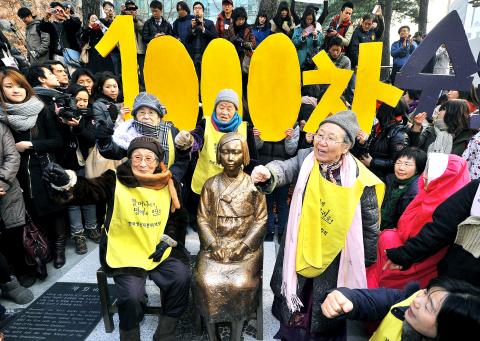14 Nov 11- Korea, Japan, Asia: It’s Complicated

Former “comfort women,” activists, and supporters holding the 1,000th “Wednesday Demonstration” in front of the Japanese Embassy in Seoul. Since 1992, comfort women survivors and others have held these rallies every Wednesday. They demand a full official apology from the Japanese government for implementing the “comfort women” system during the Asia-Pacific War. They also demand that the Japanese government honor an earlier commitment to public education about this inhumane system of sex trafficking, which was in place from the 1930s to 1945.
- Emilia HEO, “When National Narratives Clash in Multinational Classrooms“
- Asian Boss, “How Do Japanese Feel About South Korea?”
- Asian Boss, “How Do Koreans Feel About Japan”
- Asian Boss, “What the Chinese Think of Japan?”
- Asian Boss, “How Do the Japanese Feel about China?”
- Asian Boss, “Koreans and Filipinos Discuss the #CancelKorea Movement”
Thursday’s class session is our last “content” session. Starting next week, we will be turning more fully to final project preparation.
Thursday’s class focuses on contemporary South Korea-Japan relations. It will be directly relevant to the one group that will be focusing on Korea-Japan relations and the colonial era. But in other ways, it will be also relevant to many other students, in that it deals with the limitations of nation-centered memory. These limitations may also be seen in films that deal with the Korean War and South Korea’s democratization.
The issue of Korea-Japan relations (past and present) is a big topic that is central to South Korea’s “master commemorative narrative” and to counter-memories. However, in terms of counter-memories, it has grown less acute now, compared to the peak of the minjung movement, in the 1980s. Although colonial rule ended over seven decades ago, the colonial era remains central to Korea-Japan relations and to the master narrative, as we first saw with Mal-Mo-E.
As you read/view the assigned materials, keep in mind the centrality of national identity to historical memory in East Asia–and pay attention to how different nation-centered perspectives (for example, South Korean versus Japanese) come into conflict with one another, and often are the source of barriers between cross-national communication cooperation. Start with the Heo article. Heo provides a good sense of these conflicts and barriers, as she ruminates over how they may be overcome in order to achieve reconciliation by peoples from different national communities.
Asian Boss produces many interesting and informative videos about current events in Asian countries. Usually, the videos center on interviews with ordinary people. I am assigning give Asian Boss videos (links above) that are tied to this session’s topic. Watch these videos as primary sources. As you watch then, keep in mind the limitations of nation-centered perspectives that Heo has encountered in university classrooms. Analyze the Asian Boss videos to find examples of: nation-centered biases in education, traditional media, and social media, especially in South Korea, Japan, and China; and conversely, (2) the different variations on the broadly shared sentiment (by interviewees from all 4 countries) to reduce cross-national tensions and to move toward better relations and reconciliation. In Thursday’s class, we will be using the key ideas of the Heo essay to discuss the Asian Boss videos and the broader issue of nation-centered viewpoints in the globalized age.
